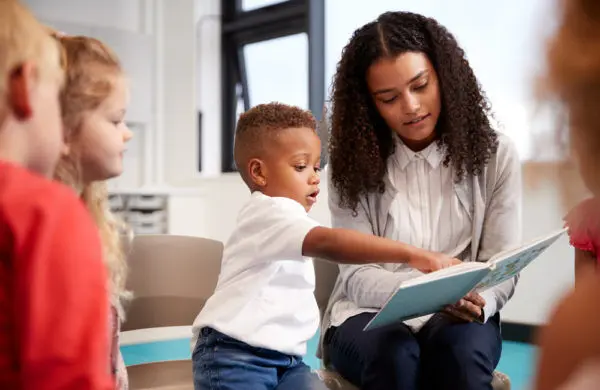Decades of research has shown the importance of early childhood education in a student’s academic skill development. Children in high-quality kindergarten through Grade 2 programs have an increased level of preparedness for later learning and reap the benefits well into their adult years.
The essential nature of a good kindergarten program in a child’s development attracts teachers committed to making a difference in a young student’s life. They appreciate the opportunity to help children build a strong educational foundation and develop a love of learning at such a young age. Their work sets students on a path to life-long learning and achievement.
Those who want to excel as kindergarten teachers benefit from a Master of Education program that focuses on the skills needed to teach early childhood education. Those skills include expertise in curriculum design, instructional strategies, observation and assessment, communication, collaboration with families and communities, and strong subject matter knowledge.
The Importance of Kindergarten for Students
Children learn a multitude of important skills in kindergarten. Kindergarten can provide a solid foundation for future learning. In addition to learning to read, write and count, kindergarteners can also develop other important academic and social skills.
Those skills include the following, according to the Targeted Reading Intervention (TRI), a North Carolina nonprofit funded by the U.S. Department of Education. TRI writes that many students learn these concepts through games, songs, music, and simple handicrafts.
- A firm grasp of the numbers up to 100, as well as basic addition and subtraction.
- An introduction to science, including basic lessons such as sorting and counting objects.
- An ability to become independent readers by recognizing all the letters and the sounds of letters, as well as the ability to read 30 high-frequency words.
- An ability to write their own sentences.
Kindergarten also provides an excellent opportunity for students to learn self-esteem and the ability to work, learn and get along with others. These social and emotional learning skills will benefit students throughout their lives.
Skills Needed for Kindergarten Teachers
Those who decide to become kindergarten teachers need strong communication skills that are useful in communicating with students, parents, and fellow educators. The U.S. Bureau of Labor Statistics (BLS), which offers information on hundreds of careers, wrote that kindergarten and elementary education teachers also benefit from having patience, physical stamina, and resourcefulness.
Teachers who develop strong talents in these areas may move on to become mentors to other teachers, helping them hone their classroom skills. They may also become counselors or instructional coordinators.
In Massachusetts, kindergarten teachers receive a salary that reflects their importance in the education system. Kindergarten teachers in Massachusetts earned an average salary of $85,470 in May 2021, the second-highest level in the country, about $300 less than California. Worcester and Boston-Cambridge-Nashua both rank in the Top 10 metro areas for kindergarten teacher pay.
Merrimack College’s Master in Education Program
Early childhood education is one of several concentrations that Merrimack College offers in its online Master of Education programs. The 36-credit program prepares graduates for their Initial License to work in grades Pre-K through grade 2. Students in the program take nine courses:
- Teaching and Learning in Inclusive Classrooms
- Challenges in Learning and Development
- Curriculum, Instruction and Assessment in Social Studies and World Geography
- Sheltered English Instruction
- Practicum for Early Childhood Education
- Introduction to Early Childhood Education
- Curriculum, Instruction and Assessment in Early Childhood Reading and Language Arts
- Curriculum, Instruction and Assessment in Early Childhood Math
Teaching Early Childhood STEAM
Students also learn to become a kindergarten teacher by participating in immersion events such as seminars, guest speakers, and networking sessions. Field experiences include three pre-practicums and a full practicum (450 hours) arranged at schools in Massachusetts near the student’s home.
The Massachusetts Department of Elementary and Secondary Education approved the program, which also is aligned with Massachusetts Professional Standards for Teachers and Subject Matter Knowledge requirements.
